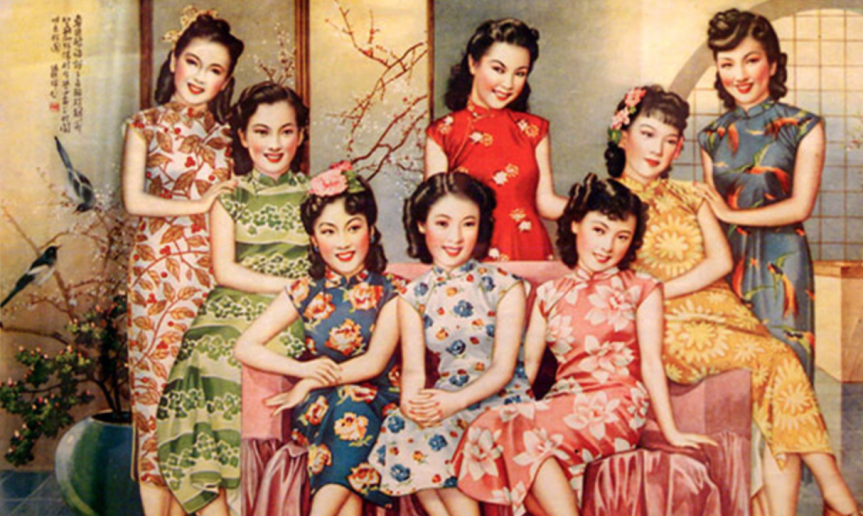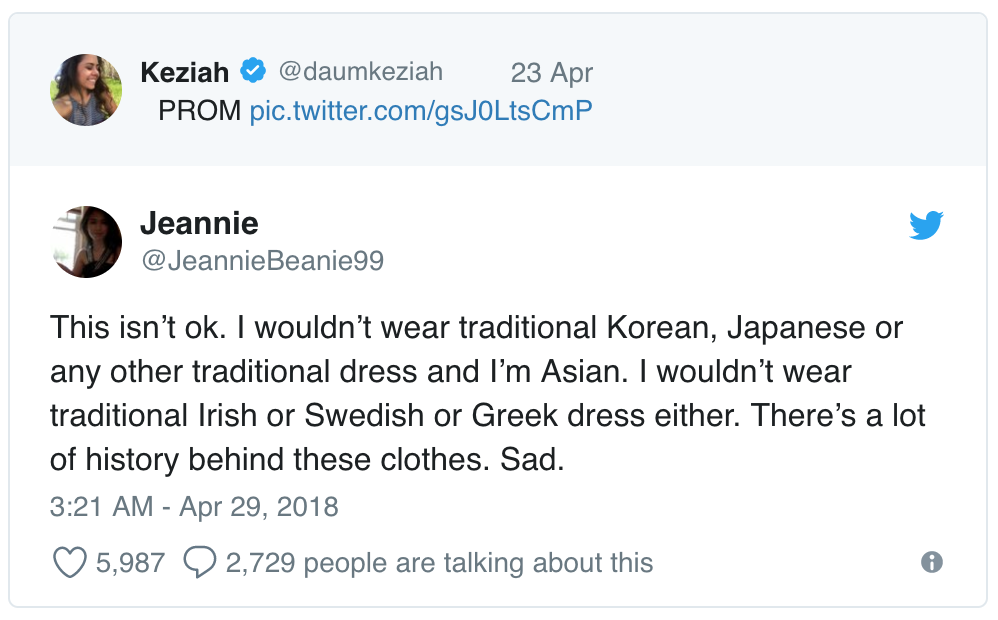|
Issue 11, Semester 1 By Ying Wong Should people get away with committing insensitive acts by simply pleading innocence? Should we all be asked to bear the weight of our decisions, no matter how ignorant we are of the consequences, particularly if those consequences have the potential to ‘offend’ others? Is the debate around cultural appropriation really just a power play between those seeking to get away with shitty things, and those who wish to fasten their tendrilous grip on their own apparently discrete “culture”? Is it even shitty to wear a qipao if you’re white? In case you missed it, there has been something of a social media meltdown after Keziah Daum, a high school student, gloatingly posted photos of herself at prom in a bright red, silk, body-hugging Chinese dress, known as a ‘qipao’. Jeremy Lam, a concerned Twitter user, sparked the debate with the retweeted comment “My culture is NOT your goddamn prom dress.” Thousands have weighed in on the situation, with many Chinese Americans agreeing with Lam’s outrage and labelling the act one of cultural appropriation. Interestingly, the South China Morning Post published that Chinese commentators on Wenxue City News had largely expressed support for Ms Daum’s decision, saying “It is not cultural appropriation... It is cultural appreciation and cultural respect.” One even suggested the Chinese government sponsor her for an appearance on state television to display her outfit.
This raises a thorny and complex question – who bears the right to determine what is and isn’t culturally offensive? Ethnically Chinese people in China? The Chinese diaspora, to whom this issue perhaps more directly relates? Or is it for the public at large to decide? Professor of Chinese History at the University of Melbourne, Antonia Finnane, questions those who argue the qipao’s historical sacredness has been culturally compromised. Objectively, there is nothing particularly sacred or culturally laden in the wearing of a qipao. The garment adopted its current, familiar shape in Shanghai in the 1920s largely as a status symbol for the burgeoning bourgeois class. It lost traction during the Cultural Revolution because it was seen as symbolising wealth, and was only revived again in the 1960s. Some commenters on Twitter (and Ms Daum herself) claim it carries significance to a feminist movement. Professor Finnane, however, says such dresses in the 1960s were “more likely to be found on a call girl than an activist,” highlighting that it is hardly ‘traditional’ or even ‘political’ garb. The qipao is still only considered a fashion choice in China, and does not carry special ceremonial importance. This is, evidently, entirely different from donning blackface or wearing a Native American headdress to your Halloween shindig, primarily because such acts involve an innate disrespect for the institutionalised oppression brought about by historic acts of a similar kind. It would seem then, that to point fingers and shout CULTURAL APPROPRIATION from the top of one’s lungs would be to alienate all physical symbols of orientalism from the rest of the world, in a fruitless attempt at reclaiming Chinese culture. Yet I can understand why people, especially Chinese from immigrant families in primarily white countries, would feel hurt that a non-Chinese would be able to trivially get away with wearing something that is so visually symbolic of our heritage. As a member of the Chinese-Singaporean diaspora in Australia myself, I have faced a fair share of both casual and overt racism in the workplace, on the street, and in my social life. Racism toward those of an Asian appearance is my daily reality, and I cling tightly to my identity in order to fend off other more hateful emotions. That a young white girl has the option to buy a cute looking Chinese-themed outfit at the store, and feel entitled to wear it to prom without a second thought, is a luxury afforded only to those who have not had to grapple with feelings of otherness in places they would otherwise call home. While wearing a qipao is not “technically” racist any more than me wearing a Kookai bodycon dress, it is not useful or helpful to label the outraged as ‘sensitive flowers’ who need to get a grip. Rather than have each side point fingers at the other, we should let events such as these challenge us to consider the more subtle divisions in society. The fetishisation of cultural tropes, though perhaps not carried out with malicious intent, can and will slowly erode the narrative of a harmonious multicultural community.
Interesting article
15/5/2018 09:44:15 pm
I appreciate the balanxed
Interesting article
15/5/2018 09:56:20 pm
I appreciate the balanced view on this, though ultimately struggle to come to the same conclusion. I'm not of Chinese descent so I can't speak to this particular instance, but I am of a non-white background and sometimes feel the concerns of people of my race about others sharing in aspects of our descent is overblown. My concern is that in being too trigger happy to point fingers at "cultural appropriation" we actually risk further crystallising Otherness further as our cultural signifiers are segmented away in the apartheid of preventing offence. Is the apparent fetishisation of the foreign really that much less preferable to the internalisation of victimhood or touchiness about others engaging with our cultural touchstones as core to the migrant experience? Perhaps pride and a forward facing, hopeful engagement with racial identity need not require such stringent limitations to be placed on others who bear witness to us from a different perspective.
Ying
16/5/2018 09:58:01 pm
Thank you for this well articulated comment; it's a very valid critique of what I have said on the issue. I wholeheartedly acknowledge that it is ultimately divisive to see culture as compartmentalised according to race, though I suppose it doesn't come through in the body of this article. I would agree that in a perfect, open-minded and forward-moving world, it would be unhelpful and counterproductive to view culture in a way that is exclusive, because it serves to deepen those rifts. However, we don't live in that perfect world, which is why I do see conversations on cultural appropriation to continue to have relevance. Cultural appropriation is not akin to having different foods available for everyone to sample and try; and it is not, as I am suggesting here, a restriction on freedom to wear a style of clothing. Those are acts of sharing that -are- beneficial to society. But I find it difficult to accept that mockery and other acts that are misguided by a racist undertone can be accepted without problematisation. If that problematisation has to happen through the framework of understanding that is cultural appropriation, then so be it.
Cultural appropriator.
16/5/2018 02:25:21 pm
“This raises a thorny and complex question – who bears the right to determine what is and isn’t culturally offensive”
Hmm
16/5/2018 03:02:40 pm
Bit reactionary and extreme but I'll jump on board your anti cultural appropriation hysteria bandwagon if it saves my favourite food, tandoori chicken pizza
Things that make you go hmm
16/5/2018 04:30:30 pm
How interesting that the proposition that the culture a person practices should not be restricted by their race is considered ‘reactionary and extreme’. What a sign of the times we live in.
hear hear
16/5/2018 05:23:55 pm
hear hear
Chill
16/5/2018 10:06:22 pm
Did you read the last paragraph?
Dan
16/5/2018 06:19:41 pm
It is not a surprise that the concept of cultural appropriation comes from America, a country historically obsessed with drawing racial boundaries.
Inquiry
16/5/2018 08:38:37 pm
“It would be wrong for me to get a Maori tattoo from a small, specific tribe, and then show it off on social media.”
Dan
17/5/2018 02:44:40 am
I think it would depend on context, but it's not a large imposition on my freedom for me to get any of a huge number of different tattoos which did not have intense personal significance to a group which would be distressed by my using it. It would be about as distasteful as having someone else's grandmother's face tattooed on me.
Arabella
17/5/2018 08:46:22 pm
Thank you for this thoughtful piece, Ying. Comments are closed.
|
Archives
October 2022
|




